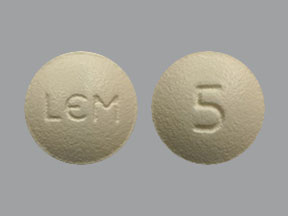Dayvigo Disease Interactions
There are 4 disease interactions with Dayvigo (lemborexant).
Lemborexant (applies to Dayvigo) alcohol
Moderate Potential Hazard, Moderate plausibility. Applicable conditions: Alcoholism
Patients treated with lemborexant should not consume alcohol as it can increase drowsiness and also the incidence of adverse effects.
References
- (2020) "Product Information. Dayvigo (lemborexant)." Eisai Inc
Lemborexant (applies to Dayvigo) COPD
Moderate Potential Hazard, Moderate plausibility. Applicable conditions: Pulmonary Impairment
Lemborexant has not been studied in patients with moderate to severe obstructive sleep apnea (OSA) or in patients with chronic obstructive pulmonary disease. Caution is advised if prescribing to patients with compromised respiratory function.
References
- (2020) "Product Information. Dayvigo (lemborexant)." Eisai Inc
Lemborexant (applies to Dayvigo) depression
Moderate Potential Hazard, Moderate plausibility.
Worsening of depression and suicidal thoughts and actions have been reported with the use of lemborexant. Caution is advised in patients with depression. Protective measures may be required in patients with suicidal tendencies, including prescription of the lowest number of tablets at one time.
References
- (2020) "Product Information. Dayvigo (lemborexant)." Eisai Inc
Lemborexant (applies to Dayvigo) liver impairment
Moderate Potential Hazard, Moderate plausibility. Applicable conditions: Liver Disease
Lemborexant has not been studied in patients with severe liver dysfunction (Child-Pugh Class C). Its use is not recommended in these patients.
References
- (2020) "Product Information. Dayvigo (lemborexant)." Eisai Inc
Dayvigo drug interactions
There are 427 drug interactions with Dayvigo (lemborexant).
Dayvigo alcohol/food interactions
There are 3 alcohol/food interactions with Dayvigo (lemborexant).
More about Dayvigo (lemborexant)
- Dayvigo consumer information
- Check interactions
- Compare alternatives
- Pricing & coupons
- Reviews (257)
- Drug images
- Side effects
- Dosage information
- During pregnancy
- FDA approval history
- Drug class: miscellaneous anxiolytics, sedatives and hypnotics
- Breastfeeding
- En español
Related treatment guides
Drug Interaction Classification
| Highly clinically significant. Avoid combinations; the risk of the interaction outweighs the benefit. | |
| Moderately clinically significant. Usually avoid combinations; use it only under special circumstances. | |
| Minimally clinically significant. Minimize risk; assess risk and consider an alternative drug, take steps to circumvent the interaction risk and/or institute a monitoring plan. | |
| No interaction information available. |
Further information
Always consult your healthcare provider to ensure the information displayed on this page applies to your personal circumstances.


